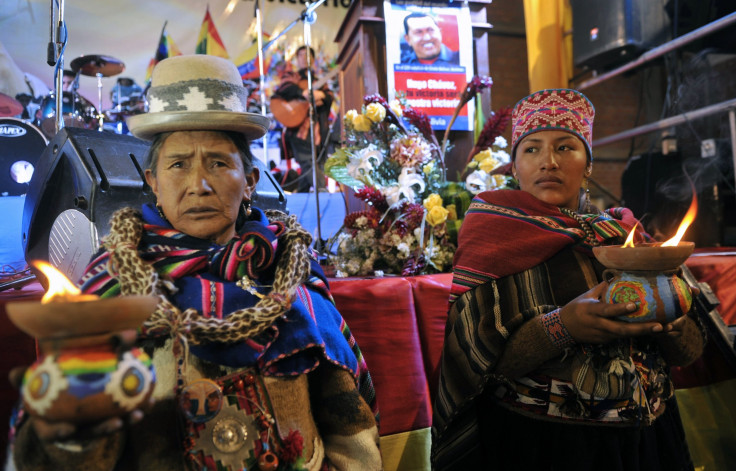Indigenous Women In Bolivia Use Ancient Knitting Skills To Weave Devices For Congenital Heart Disease

To help the growing number of children born with heart defects, indigenous Bolivian knitters are putting their age-old craft to a more modern use. The Aymara women, who have been knitting intricate and distinct hats, sweaters, and blankets for centuries, are now using their skill to produce an innovative medical product that can seal holes in a baby’s heart.
“We are very happy. We are doing something for someone so they can live,” one of the knitters, Daniela Mendoza, told BBC News.
The device, called Nit-Occlud was developed by cardiologist Dr. Franz Freudenthal. After setting up a clinic in La Paz for children with heart defects, Freudenthal knew he must develop a simple, inexpensive solution to help treat more patients. The occluder, the device's more common name, looks like a top hat and can be inserted into the heart without surgery to help fix the problem.
Occluders are usually mass produced in industrial environments, but Freudenthal’s model is too small and delicate to be left to a machine. To solve this problem, he recruited some of Bolivia’s finest knitters, knowing their attention to detail and light hand would be perfect for producing the device.
“The most important thing is that we try to get really, really simple solutions for complex problems,” he said.
Congenital heart problems can be very debilitating to those diagnosed with them, as the heart is forced to work twice as hard to pump blood than a healthy heart. According to the Mayo Clinic, the symptoms accompanying congenital heart disease are usually difficulty breathing, getting tired easily with little exertion, and often feeling dizzy or faint. Congenital heart problems can be defined as any abnormality in the heart upon birth, but Freudenthal has decided to specifically look at heart holes, or patent ductus arteriosus (PDA).
When a baby is first born, a blood vessel known as the ductus arteriosus must close in order for blood to bypass the lungs. But if the duct does not close on its own, blood flow to the heart becomes strained. With the high altitude in La Paz — an average of over 13,000 feet above sea level — these problems become 10 times more frequent among children being born than in countries closer to sea level.
But Bolivia has also faced another problem combatting this growing illness: Being the poorest country in South America, Bolivia lacks specialist hospitals and cardiologists trained to treat these heart problems. In addition to this, open heart surgery, which is expensive and risky, goes against the beliefs of many of Bolivia’s indigenous population. And with one of the highest child mortality rates in the world, Freudenthal knew he had to do something.
Freudenthal’s occluder is created from weaving a single strand of an elastic type of metal, known as nitinol. This type of medal can memorize its shape, even when folded into a catheter, to make introducing it into the body much easier. The catheter is inserted through the groin and travels through blood vessels until it gets to the heart, where the device is expanded to plug up the hole — no surgery needed. It also can stay there for the patient’s lifetime without needing to be changed.
“By not operating with an open heart we are also respecting the will of many patients who would not want their children to be operated otherwise.”
So far, Freudenthal has received much success and praise for his new invention. In one case, he has helped a 6-year-old, Cinthia, who could not walk a block before without getting tired.
“She used to get purple when crying, she almost fainted,” said her mother, Victoria Hilari. “That’s how I realized she had a problem, but I didn’t know what to do.”
But now Cinthia is a vivacious little girl, running, playing, and even passing physical education with the help of the new implanted device.
Overall, Freudenthal is happy he can help cases like Cinthia’s, but he owes much of his success to the help of one of Bolivia’s most prized traditions.



























